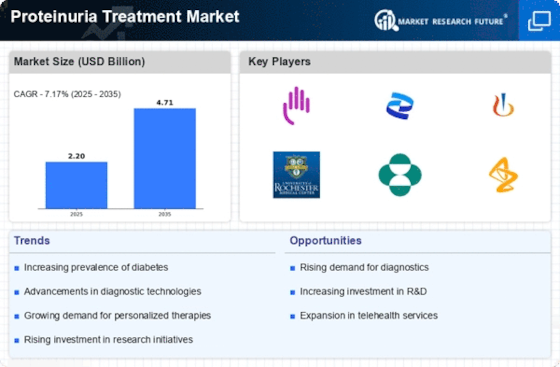Market Analysis
In-depth Analysis of Proteinuria Treatment Market Industry Landscape
Various factors within the healthcare industry, especially the pharmaceutical sector, combine to influence the Proteinuria Treatment Market, ultimately making it vary from time to time. The prevalence of infections leading to proteinuria remains one of the main drivers behind this particular market, if not its most important element. Changes happening across medical studies, as well as understanding underlying mechanisms behind problems, really affect how people treat patients suffering from these conditions. Research continues to focus on finding new therapeutics, including medicines that target pathways involved in the development of proteinurias. Innovations towards drug discovery and precision medicine continue affecting available treatment thereby changing dynamics within this sector. When developing any treatment option for use by persons with proteinuria, regulatory considerations play a critical role. They are essential aspects of the manufacturing process used to ensure that the medications used for different medical conditions under these circumstances through safety and efficacy standards put in place for their use. Economic factors have an enormous impact on the proteinuria treatment market. Economic growth and stability also lead to increased investment in research and development, which enables healthcare providers and patients to access innovative treatment options more easily. On the other hand, economic constraints can affect healthcare budgets, hence determining affordability and the adoption of proteinuria treatments. Depending on where someone resides, affordability will depend largely on reimbursement policies since economic drivers do influence healthcare choices. Another important market factor is the competitive landscape among other pharmaceutical companies, research institutions, and healthcare providers. Fierce competition encourages innovation among manufacturers as they try to come up with medications that accurately target the actual causes of proteinuria. Those passionate preferences of consumers, specifically nephrologists, healthcare professionals, and patients with proteinuria, affect the market for the treatment of this condition. Healthcare providers may prefer drugs that reduce proteinuria effectively while minimizing any side effects. Also, the general direction in kidney disease management, as well as a shift from curative to preventive health care, influence the treatment of proteinuria. Early intervention and diagnosis of conditions such as diabetes and hypertension, which cause proteinuria, are consistent with proactive healthcare management trends in general.

















Leave a Comment